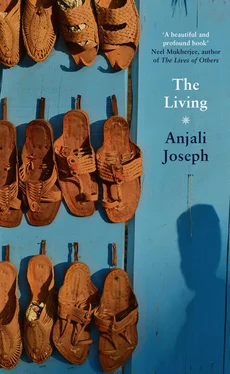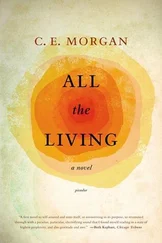Before I got to the door the paan walla told me there had been a call for me at the PCO. I wiped my face and went to find out. It was my brother, the man said. I called back, wondering what was going on. As I listened to his PCO ringing — he must have been waiting near it, as I was, a man on the street — I was aware of the footfalls around me; footfalls, and voices. I was tired. I hadn’t slept well the previous night, wondering if I would be able to see Ratna before she left. I hadn’t known if we would have the time to have sex. In the event her husband was out, and we did it, quickly, on the floor, in the same place as the first time. The return, a circle closing, struck me, but I looked at her as she lay on my shoulder for a few minutes and said nothing, because we didn’t talk about things. As I walked home all the emotion I hadn’t allowed myself to feel in the last few months flowed through me. I had been with this woman, and I hadn’t known her at all, hadn’t let her know me. Sometimes when I’d been apart from her, I’d felt her presence, only a few streets away, in her own house, with her husband, but no children, for she said there was something wrong with her and they weren’t able to have any.
Now all that was gone. I was lonely again, amid the sound of footsteps, car horns, lorries, the smell of fumes, the voices of passers-by.
Arun? said Sanjay’s voice on the other end of the line.
Yes, I said.
He said it was Atya, our father’s elder sister. She’d had a heart attack and been taken to hospital, where she’d had another. It wouldn’t be long.
I wasn’t expected to do anything, or even say much. He was just telling me. I hung up and went back towards the house.
My aunt was more than ten years older than my father. It had been she, more than his mother, who’d brought him up. She hadn’t been in good health since the time we moved. She didn’t take care of herself: she liked fried food, late nights, a shot of rum if it was around. She chewed supari and smoked beedis, at times in quantities. No one questioned her, certainly not my uncle. I remember him only vaguely. He was an ordinary man with a gambling addiction. He was pleasant enough: he would give us a few pice, or buy us puffed rice, or a rubber ball.
When I was young, eight or nine, I was a silent, interior person, unperceived by my family. My older brother had a gang of friends and they went out to do teenage things. I was still a child. I remember Atya turning to me during a visit. We were the only two inside. She was cooking and smoking, and stopped to relight her beedi.
You’re always watching, Arun, she said. What are you thinking?
Nothing, I said. I don’t know.
She shoved a pile of bhindi at me. Here, she said. Make yourself useful. Cut off the tops.
I began to trim the bhindi.
Not like that, she said. Don’t take off so much. See? You’ve wasted this.
I squinted down at the geometric green tubes, and sticky strings of sap.
My aunt turned again to look at me. It was dark, and her back was to the window, so I hardly saw her face. You’re too serious, she said. You think too much. You need to be strong to survive in this world. Make the world fit in with you, don’t try to fit in with the world. Don’t let people make you feel bad.
Before I went into my house that day I thought, there is a certain number of breaths each of us has to take, and no amount of care or carelessness can alter that. I said goodbye, in my heart, to my aunt, and wished her good luck.
As I went in to tell my wife and sons the news I thought that it is the living we should pity, for the life they have yet to go through. There were many nice things in my days. In the morning I enjoyed my tea, and shaving under the tree. When I had been working for a while I liked the moment when I came out of my trance and became aware of the road, the horn of a car, and maybe a bullock cart trundling past; the moment when the world came in through the open door and I realised I would soon be hungry. I liked to sit with a tumbler of water after my lunch and look at the tree behind the house, to feel the sun on my face before I went in again to work. I liked to see my sons laughing, to hear their voices. And yet I thought of Ratna and the fact that she was going for good and knew with certainty that I could die at any time, absolutely without grief. And this thought once again brought tears to my eyes, for reasons I would have found it hard to justify, tears that I passed off as relating to the imminent death of my aunt.
She was carrying one or two packages, and other things were piled on the side. There was a cloth near the cupboard.
What are you doing? I said. My voice sounded gravelly.
Everything’s gone bad, she said, and went out with an armful of cloth.
What happened, I groaned. I lifted myself on one arm and began to sit up. It was an operation. First I lifted the head. Then I propped myself on one hand. A certain amount of groaning while I straightened. Twinges in the back. And it was done.
She came back, insultingly upright, and squatted next to the cupboard. You’ve used too much phenyl, I said. The smell’s strong.
She looked up. We’ll need new clothes for the wedding, she said. These ones have rotted.
Clothes, I said. Who knows if I’ll even be well enough. In my mind I saw my niece’s face. We must go, I said.
She was looking in the cupboard. Things have been lying here for years, she said. No one looks. No one takes care of anything.
She turned to face me. I did know about you and that woman, she said. How stupid do you think we are? Everyone knew.
I remained frozen on the bed. I wanted to laugh. This is part of the illness, I told myself.
You started talking the other day, remember? Before we took you to the hospital.
I looked down. I don’t know what I said, I muttered.
Too much and not enough, she said. As usual.
So you’re just going to sneer at me, is that it? I said. You don’t understand. You don’t want to understand. We should both calm down, I added, remembering that I was ill and this wasn’t a good time to pick a fight. I longed for comfort.
She remained staring at me. Suddenly she sat on the floor.
Why are you sitting there? I said. Sit on the bed.
No, she said. After a moment she sighed and put her head on one hand, resting her elbow on her thigh.
Come on, I said. You’re making me get up, I added reprovingly. I went to sit opposite her. What is it? I said.
She shook her head. Sometimes I feel so sorry for her. She needs, probably not me, but someone, and there’s no one else. Still, I hold myself back, for I’m not getting what I need either. One of us has to grow up, I thought, and immediately began coming up with reasons why it shouldn’t have to be me.
After a time she wiped her face, thoroughly, one hand massaging around each eye. She stood.
Come, sit on the bed, I said.
No, she said. I haven’t finished my work.
I stood too. Oh, I said, ah. On my way to the outhouse I stopped at the kitchen door. It was years ago, I pointed out. I made a mistake, I added, not completely believing this.
She was herself again. Yes, she agreed. It was years ago.
I walked out and thought, how like her not to say anything. I imagined the life we might have led if I had not been so stupid or selfish, the relationship we might have had, some greater tenderness. I was trembling as I waited in the outhouse, without great result, though I managed to urinate a little. Maybe it’s getting better, I thought, shaking myself out. Maybe things will start flowing again. I had been confused, nothing but a child pretending to be a man. I’d thought no one had noticed.
Читать дальше
Конец ознакомительного отрывка
Купить книгу











